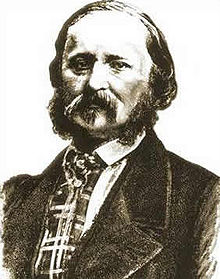Leon Scott
| Édouard-Léon Scott de Martinville | |
|---|---|

Édouard-Léon Scott de Martinville
|
|
| Born | 25 April 1817 |
| Died | 26 April 1879 (aged 62) |
| Residence | Paris |
| Occupation |
|
| Known for | Inventing the earliest known sound recording device |
Édouard-Léon Scott de Martinville (25 April 1817 – 26 April 1879) was a French printer and bookseller who lived in Paris.
He invented the earliest known sound recording device, the phonautograph, which was patented in France on 25 March 1857.
As a printer by trade, he was able to read accounts of the latest scientific discoveries and became an inventor. Scott de Martinville was interested in recording the sound of human speech in a way similar to that achieved by the then new technology of photography for light and image. He hoped for a form of stenography that could record the whole of a conversation without any omissions. His earliest interest was in an improved form of stenography and he was the author of several papers on shorthand and a history of the subject (1849).
From 1853 he became fascinated in a mechanical means of transcribing vocal sounds. While proofreading some engravings for a physics textbook he came across drawings of auditory anatomy. He sought to mimic the working in a mechanical device, substituting an elastic membrane for the tympanum, a series of levers for the ossicle, which moved a stylus he proposed would press on a paper, wood, or glass surface covered in lampblack. On 26 January 1857, he delivered his design in a sealed envelope to the French Academy. On 25 March 1857, he received French patent #17,897/31,470 for the phonautograph.
The phonautograph used a horn to collect sound, attached to a diaphragm which vibrated a stiff bristle which inscribed an image on a lamp black coated, hand-cranked cylinder. Scott built several devices with the help of acoustic instrument maker Rudolph Koenig. Unlike Edison's later invention of 1877, the phonograph, the phonautograph only created visual images of the sound and did not have the ability to play back its recordings. Scott de Martinville's device was used only for scientific investigations of sound waves.
...
Wikipedia
